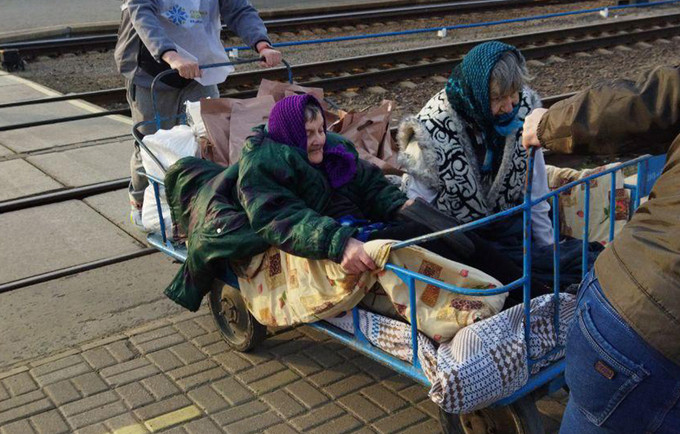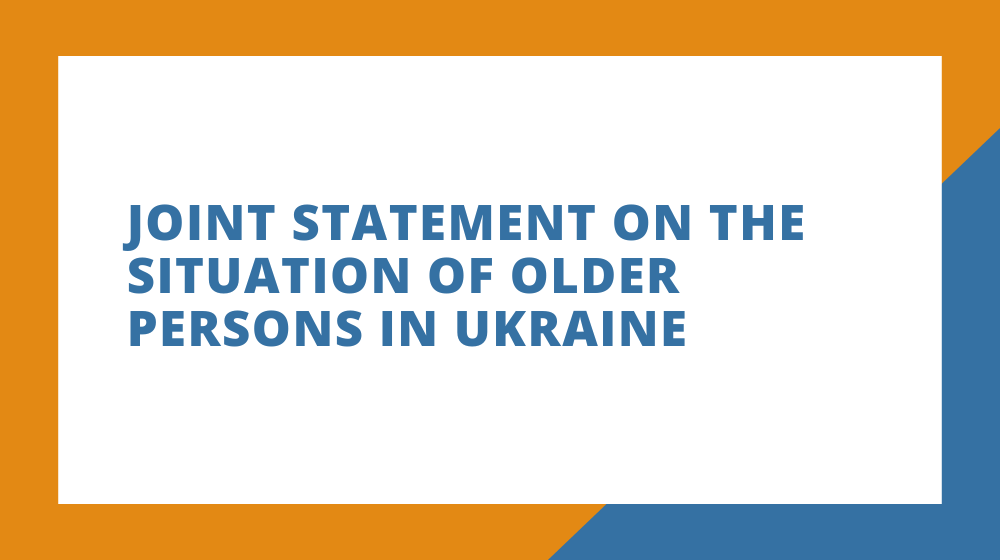Since the start of the war in Ukraine on 24 February 2022, we have witnessed a devastating escalation of violence which has resulted in the large-scale displacement of close to 14 million people—within Ukraine, into neighbouring countries and well beyond. This is the largest refugee outflow in Europe since World War II.
Everyone living in Ukraine has felt the impact of this war, but in a country where one in four people is over 60, the impact on older persons, including those with disabilities, has been dramatic. In the Donetsk and Luhansk oblasts alone—where some of the most intense fighting has taken place—an estimated 30 per cent of the population is made up of older persons.

Older women being evacuated by volunteers from a UNFPA partner organization at Kramatorsk train station, Ukraine, March 2022. © Yaroslav Boiko
To say that the health, rights and well-being of older persons are in danger is an understatement. The long-term impacts in this regard began as far back as 2014 in the initial years of this long-running crisis. Amid ongoing warfare, older persons encounter ever-increasing challenges accessing pensions, healthcare and other basic services.
In areas of intense fighting, all age groups, including older persons, face serious threats to their lives. However, older persons who have chosen to remain in their homes are often confronted with specific challenges in finding appropriate shelter, basic necessities and supplies due to infirmity, small social networks, lack of digital literacy, etc. This harsh reality must be addressed urgently.
The war has also brought forced separation and isolation. Those older persons who have relocated to other areas within Ukraine have undertaken arduous journeys, beset with risk, lacking access to basic health care and other needs while on the move—all while being away from their families and loved ones. Many of those who have remained in their own towns have also experienced limited access to services and a breakdown of their social networks.
Furthermore, those who have managed to flee to neighbouring countries face an uncertain future, with few options to earn an income, often managing chronic health conditions, and without knowing when or if they will ever be able to go home.
Not least, the war has also placed a spotlight on the heightened challenges faced by women and girls, including older women. Sixty per cent of people over 60 years old who have been affected by the war are women. Fears about their safety, health requirements and their financial and economic needs should urge everyone involved in the humanitarian response to act .
Since the start of the war, local and national authorities, humanitarian actors and UN agencies have been on the ground, providing invaluable support to civilians affected by the violence—including older persons. But as the war enters its fourth month, it is crucial that these efforts do not lose momentum, given the many needs of those directly affected.
That is why we, as members of the Joint Programme on Ageing—which advocates for the strengthening of rights and the safeguarding of dignity of older men and women—are calling on all humanitarian and other actors to pay special attention to older persons and their specific needs, whether they choose to stay in place or are on the move.
Essential life-saving support, as well as necessary evacuation assistance, should be provided to those who have not been able or willing to leave their homes, including those living in care institutions. Older persons who have left the main war zones must also have their specific health and humanitarian needs met through access to a full package of basic services including food and water, appropriate shelter, healthcare, essential medicines and assistive technologies, mental health and psycho-social support, along with other entitlements such as access to pensions, transport and information.
Both during peacetime and amid crises, the Joint Programme on Ageing works to uphold the rights and safeguard the health and wellbeing of older men and women through improving and sustaining health and social care provisions. This means that, even as this overwhelming crisis unfolds, we will continue to collaborate with partners to ensure person-centred health and social care for older people—regardless of where they may be.
The risk to older persons in Ukraine is real and must not be neglected. We are collectively issuing an urgent call for the international community to recognize and shine a light on the specific needs of older people in this war, leading to concrete and long-term action.
Signatories:
Giulia Vallese, UNFPA, Director a.i., Regional Office for Eastern Europe and Central Asia
Dr. Hans Henri P. Kluge, WHO, Regional Director for Europe
Khaled Hassine, OHCHR, Economic, Social & Cultural Rights Advisor/Rio Hada, Team Leader, Economic, Social and Cultural Rights
Chris Mclvor, HelpAge International, Lead Regional Representative for Eurasia & Middle East
Joint Programme on Ageing
An initiative led jointly by the United Nations Population Fund Regional Office for Eastern Europe and Central Asia (UNFPA/EECARO), the World Health Organization Regional Office for Europe (WHO/Europe), the United Nations Economic Commission for Europe (UNECE), the Office of the United Nations High Commissioner for Human Rights (OHCHR) and HelpAge Regional Office for Eurasia and the Middle East. The Programme supports countries in strengthening the rights and safeguarding the dignity of older men and women by improving health and social care provision and enabling environments across Europe and Central Asia.


